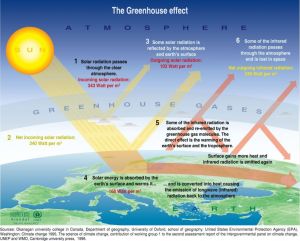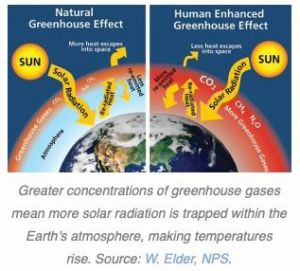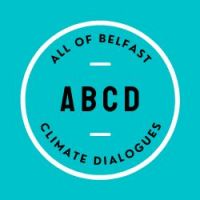There is broad agreement in the scientific community that climate change is real, happening now, and that it poses risk to life as we live it today. But how does it work and what is really happening in Maine? The resources below each present the basics of climate change focused on human health, natural habitat, and Earth as a system.
A note on the difference between climate and weather: Climate and weather both refer to atmospheric conditions, but there is a key difference. “Weather” refers to short term events or conditions. “Climate” refers to the longer term (30-year) average of atmospheric conditions.
Climate Change Basics
Illustrated overviews of climate change science
The following three overviews each present the basics of climate change, and represent the breadth of impacts and organizations responding. Each presents the same basic information, with the emphasis appropriate to its audience.
 The Climate Change 101: climate science basics document presents a short and clear explanation of the mechanisms of climate change and its impacts, with links for more information. Created by the Public Health Institute’s Center for Climate Change and Health, it emphasizes the ways that climate change impacts human health.
The Climate Change 101: climate science basics document presents a short and clear explanation of the mechanisms of climate change and its impacts, with links for more information. Created by the Public Health Institute’s Center for Climate Change and Health, it emphasizes the ways that climate change impacts human health.
 The Land Trust Alliance offers the basics with links for more information on the climate change impacts on various land types.
The Land Trust Alliance offers the basics with links for more information on the climate change impacts on various land types.
 The National Aeronautical and Space Agency has been tracking climate change indicators from orbiting satellites for decades. NASA, an independent agency of the federal government, studies Earth’s climate as a matter of national importance.
The National Aeronautical and Space Agency has been tracking climate change indicators from orbiting satellites for decades. NASA, an independent agency of the federal government, studies Earth’s climate as a matter of national importance.
Watch Dr. Katharine Hayhoe’s PBS Global Weirding series
 Check out Dr. Katharine Hayhoe's Global Weirding series, which answers frequently asked questions about climate change.
Check out Dr. Katharine Hayhoe's Global Weirding series, which answers frequently asked questions about climate change.
International consensus
 The Intergovernmental Panel on Climate Change (IPCC) - an international group of scientists - has been providing science-based assessments of climate change to policy makers regularly since 1988. In 2021 they released their sixth assessment report. Key findings include:
The Intergovernmental Panel on Climate Change (IPCC) - an international group of scientists - has been providing science-based assessments of climate change to policy makers regularly since 1988. In 2021 they released their sixth assessment report. Key findings include:
- Climate change is intensifying the water cycle. This brings more intense rainfall and associated flooding, as well as more intense drought in many regions.
- Coastal areas will see continued sea level rise throughout the 21st century, contributing to more frequent and severe coastal flooding in low-lying areas and coastal erosion.
Explore the IPCC’s 6th Assessment Report website for details and supplementary materials.
All of Belfast: Climate Dialogues began in 2020 as a grant-funded project to facilitate conversations among a broad cross-section of the Belfast community about climate change. The ABCD project became a presence in the community, establishing the Library as a source for information and a gathering place for conversation about the climate crisis and community response. From 2020-2023, ABCD held over 35 educational programs & community conversations engaging well over 1,000 people. The Library will continue to offer educational programming on topics around the climate crisis; and will continue supporting citizens to take action.
This project of the Belfast Free Library was made possible by a grant from the Institute of Museum and Library Services (IMLS grant number: APP-246100-OLS-20). Contact: [email protected].


